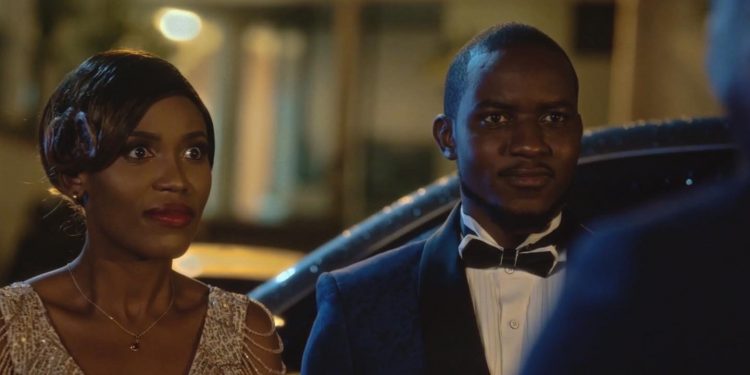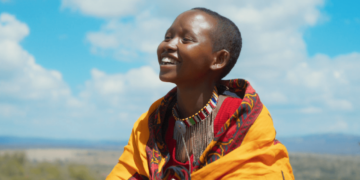Chaguo is a modern-day retelling of Shakespeare’s most famous play, Romeo and Juliet. In this iteration, Vincent Mbaya re-teams with his Country Queen collaborator, Ravi Karmalker (Good Karma Fiction), to bring us another political drama that, while packed with noble intentions, falls short of creating a memorable political drama.
Chaguo follows two lovers, Wendo (Nyokabi Macharia, County 49) and Mugeni (Nick Kwach, County 49), as they balance their occupations and an imminent wedding. And it is at this point that the film truly shines; they have palpable chemistry, and Nyokabi’s performance ultimately carries the film. When the two’s families enter the picture, it becomes clear that they hail from two large rivaling tribes. Wendo’s family is a working-class one that is divorced from authority, and Mugeni’s tribe is one that is ensconced with power and riches. But the writing starts to become genuinely clever when they avoid the cliché of painting one tribe as the big bad wolf and the other as the poor man with a heart of gold. Instead, the film highlights tribalism’s cognitive dissonance and how it causes society’s pillars of morality—democracy, the family, even religion—to degenerate. Unfortunately, the same dissonance can be said of Chaguo itself.
Kenyan cinematography is quickly rising to be among the best in the continent. Andrew Mungai (Kati Kati) serves as Director of Photography in this picture, and the film is as beautiful as ever. The lighting is flawless, whether at night or during the day, and looking at the screen is just pleasurable. It’s tough to dismiss the idea that Mungai’s pinnacle is still to come, and watching his career as he continues to challenge himself has been a thrill for anyone who respects the artform. The same cannot be said about the sound design; there were times when the sound became utterly dull, and it was easier to keep up with the sound of the car’s engines revving than the actual dialog. Another component of the sound design that was vexing and not isolated to this film was the decision to use loud, irritating, royalty-free music from YouTube instead of a traditional film score. The choice just made the film feel cartoonish and hampered the audience’s immersion.
Regardless of the music, the performances in Chaguo salvaged anything else that could have been missing. Kenyan film fans have been longing for new faces onscreen, and they should be pleased with the casting in this film, as the aforementioned Nyokabi Macharia certainly shines. It feels like seeing the emergence of a star. Nyokabi was also in excellent company, as Abel Amunga (Selina) portrays the evil politician Njama Magero quite well. Amunga manages to embody Njama, letting him transcend the obvious traps that might make it appear to be a parody. Amunga manipulates the audience in the same way he manipulates the characters in the film; you will feel as he wants you to feel, and when you laugh, it is because he wants you to laugh. Outstanding performance. Another highlight was Joel Otukho (Country Queen), who did so much with so little screen time as Ekene Juma, Wendo’s father. In one speech, Ekene shows the audience that the tribal split is simply founded on one tribe’s hatred being driven by fear of stagnation and the other tribe’s hatred being motivated by fear of regression. Few actors can pull that off.
Brian Ogola’s (Crime and Justice) role as the underdog candidate whose magnetism persuaded the larger society to see past their differences and try out a new road of unification fuelled by honesty and integrity, on the other hand, didn’t fully succeed. Ogola’s performance simply lacked the charisma that everyone in the film appeared to revere. Every time he appeared onscreen, he drained the life out of the previously developed tension. Ogola is a well-established actor with impressive work, but Chaguo is not his finest hour.
Overall, Chaguo was a film with many high points and few low points.
Update: Chaguo is now available to stream on Netflix.











